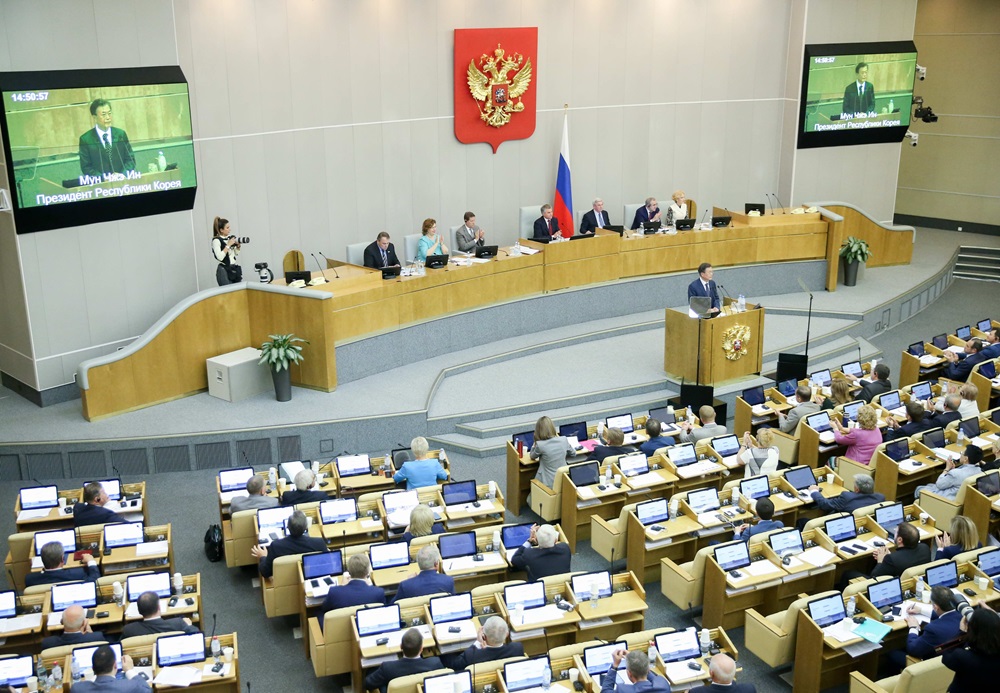Russia's Imperfect Constitution
Zjuganov's communists have once again submitted a bill to the Duma calling for a Constituent Assembly to approve a series of changes to the Basic Law. But the Kremlin is bracing itself for plebiscite votes in the 2020 amendments and the 2024 presidential elections, without the need for further bureaucratic complications
Moscow (AsiaNews) - Communist Kprf deputies in the Moscow Duma have signed a bill ‘On the Constituent Assembly’, which is the eleventh attempt, according to observers' calculations, to apply Article 135 of the Russian constitution, a requirement to approve the most important changes to the basic law and which has never been applied in the thirty-year post-Soviet period.
This is fuelling a controversy that is actually not very incisive on the part of some opponents, who claim the illegitimacy of Vladimir Putin's re-election, who took advantage of the cancellation of previous mandates under the 2020 amendments, without even the shadow of an assembly.
The rule was actually not approved or implemented back in 1993, with the first Elysian variant, without any explanation other than the widespread belief that the assembly ‘brings bad luck’, recalling with superstitious suggestion Lenin's constituent assembly after the revolution, which was immediately dissolved because the Bolsheviks were in the minority. And in general the feeling prevails that if you change even a comma, then there is the risk of not being able to stop, and of twisting the whole text in one direction or another.
The communists led by the elderly leader Gennadij Zjuganov have decided to take the initiative for the umpteenth time, the fourth in the last ten years, mindful of the solemn constitutional revisions that each party secretary put into practice on ascending to power, so that in the USSR the Leninist, Stalinist, Christocenevist and Brezhnevist constitutions followed one another. Now that the Yeltsinian one is in force, interpreted and revised in Putin's sauce, the KPRF wants to give a signal of ‘return to legality’ against the new totalitarianism.
The communists had last made the same request in the fateful year of 2020, but Dmitry Medvedev's government rejected it as ‘unnecessary’, using futile technicalities as justification. Even now there seems to be an appeal to inaccuracies and incomplete details, as if it were not possible to fix everything in parliamentary discussions.
Other alternative proposals have been lying on the Duma's agenda for years, which envisage the popular election of the members of the constituent assembly, or the formation according to the quotas of the various branches of the central and regional administrations.
Behind the assembly project there is also a suggestion that takes one back to late-medieval Russia, today very much back in fashion in the recovery of ‘traditional values’, recalling the Zemskij Sobor established in the 16th century, the ‘Council of Russian Lands’ that brought together nobles, clergymen, merchants and peasants, and that in the early 17th century gave rise to the Romanov Tsar dynasty. In this sense, the Kremlin is taking advantage of the plebiscite votes in the 2020 amendments and the 2024 presidential elections to affirm the popular sobornost that embodies the spirit of ancient Russia, without the need for further bureaucratic complications.
All the more so since the current trend of war-mongering Putinism leads to the idea of abolishing any connection with international law and asserting the superiority of Russian laws over any other ‘foreign influence’, as insisted by the laws on the subject that Russia also extends to neighbouring countries, such as Georgia and Kyrgyzstan.
This goes back to even older texts such as the Domostroj, the ‘House Rule’ prepared in the first half of the 16th century by the protopop Silvestr, Ivan the Terrible's advisor, which imposed the tsar's censure on any excess of opposition in the circle of boyars.
The constituent assembly, according to the original wording, should also be convened to approve extraordinary decisions, such as a federal state of emergency or the proclamation of a state of war in the country. In this sense, reality has already far exceeded the feeble pretensions of the Russian communists, and also all the laws that have been written and passed, which only pursue a regime that certainly does not question its legitimacy. As the head of the group of parliamentary experts, Konstanti Kalacev, replies, ‘if there is Putin there is Russia, without Putin there is no Russia’.







.png)










